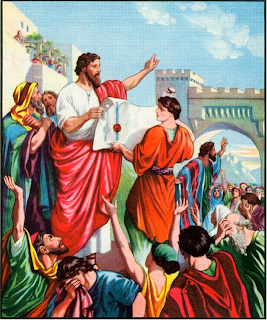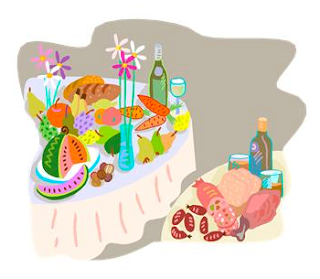 |
| Reading the Law - Artist unknown |
TO CHEW ON: "And Nehemiah, who was the governor, Ezra the priest and scribe, and the Levites who taught the people said to all the people, 'This day is holy to the Lord your God; do not mourn nor weep.' For all the people wept, when they heard the words of the law." Nehemiah 8:9
If you are familiar with Moses' law—that part of the Bible we find in sections of Exodus and Leviticus—you may well be surprised to see people weeping when it is read. Why would they weep on hearing a bunch of rules?
On thinking about it, I can come up with several reasons;
- It may have been the emotion they felt as they again connected with their religious and cultural roots. It seems that these people were unschooled in the law. We can assume that because of the way they needed a lot of explanation when it was read (Nehemiah 8:7). Even so, they probably had glimmerings of it, passed down through generations. But on this momentous day, as they respectfully stood for its reading, they were hearing the real thing for the first time in their lives. No wonder they got choked up.
- They were saddened by how far they had strayed from the law's requirements. But their teachers urged them—don't look at yourselves; focus on God. Make this day holy or separate to God. Let the joy of who God is and what He is doing now, energize you (Nehemiah 8:9-10).
- They were under conviction and their tears were evidence that God was at work in their lives. I love how this incident is the climax of their wall-repair project—an experience that had been both exhilarating and stressful. But they had completed it
Fresh from the victory of re-establishing the integrity of their city, they were primed for the victory of returning to God in spirit. Their sensitivity to God's will and eagerness to obey is on display as they jumped to obey the instructions to keep the Feast of Booths—something that had apparently not been done since the time of Joshua (Nehemiah 8:13-18).
What is our reaction to God's word? We have not only the Law, but the stories, the prophets, the New Testament, much of it plain and easy to understand.
- Do we respect it (to the extent of willingly standing for its reading when our pastors instruct us to, of course) as these people did?
- Do we hear it with the sense that it applies to us personally?
- Do we focus on how badly we've messed up, or on God and His goodness to us, His plan of salvation, and the hopeful outlook that trust in Him brings?
- Are we quick to change our ways when we see where we have been disobedient?
PRAYER: Dear God, thank You for Your word which tells me about You and educates me in Your ways. May I take it as personally as these people who, on hearing, wept, repented, and obeyed. Amen.
PSALM TO PRAY: Psalm 50
*********
Unless otherwise noted all Scripture quotations are taken from the New King James Version®. Copyright © 1982 by Thomas Nelson, Inc. Used by permission. All rights reserved.





